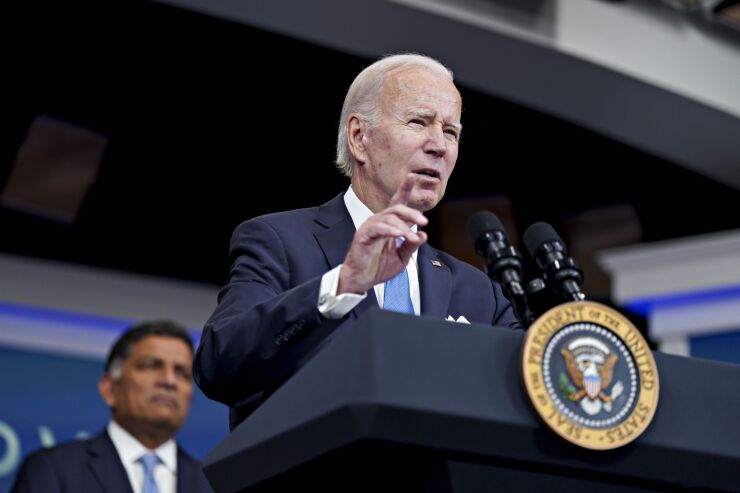WASHINGTON — The Consumer Financial Protection Bureau issued guidance about "junk fees" Wednesday, warning banks that surprise overdraft charges that customers cannot reasonably anticipate or avoid likely violate the Consumer Financial Protection Act.
President Biden and CFPB Director Rohit Chopra promoted the guidance in a White House briefing, giving political weight to consumer financial issues just ahead of the 2022 midterms as voters grow increasingly concerned about inflation.

"Americans are willing to pay for legitimate services at a competitive price, but are frustrated when they are hit with junk fees for unexpected or unwanted services that have no value to them," Chopra said.
Biden said that he "appreciates the frustration" of Americans when it comes to high prices at the gas pump and on shelves, and that the CFPB's actions will "put more money in the pockets of middle-income and working-class Americans."
"One of the things that I think frustrates the American people is they know the world is in a bit of disarray — they know that Putin's war has imposed an awful lot of strains on Europe and the rest of the world and the United States, everything from him blocking grain shipments and oil," Biden said. "And they want to know, what are we doing. And, there's a lot going on that we're doing, and it adds up."
The move is the latest effort by the bureau to
The guidance warns against two tfee practices that the CFPB says are "likely unfair and unlawful." The first are "surprise overdraft fees," which include those charged when consumers had enough money in their account to cover a debit charge at the time the bank authorized it.
The second category of fees are those "indiscriminately charging depositor fees to every person who deposits a check that bounces," according to the CFPB.
Banking groups challenged the guidance as unnecessary and a suspect regulatory strategy.
The Consumer Bankers Association pointed out that many firms have already made changes to their fee structure.
"The nation's largest banks have introduced new, innovative products and policies designed to provide consumers greater choice, transparency and control of their money," CBA President and CEO Lindsey Johnson said in a statement. "These changes were made without regulatory or legislative intervention. The reality is that America's leading banks are required by law to clearly disclose fees charged for all products and services they provide consumers."
The Bank Policy Institute said that banks would "welcome a return to a regulatory world where the rules are clear and transparent, and applied universally."
"The CFPB has clear authority to define prohibited fee practices through notice-and-comment rulemaking, but instead continues to rely on invective-filled guidance, which is legally nonbinding but which the CFPB has a history of improperly enforcing through the nonpublic examination process and threats of enforcement action," BPI President and CEO Greg Baer said in a separate statement.





